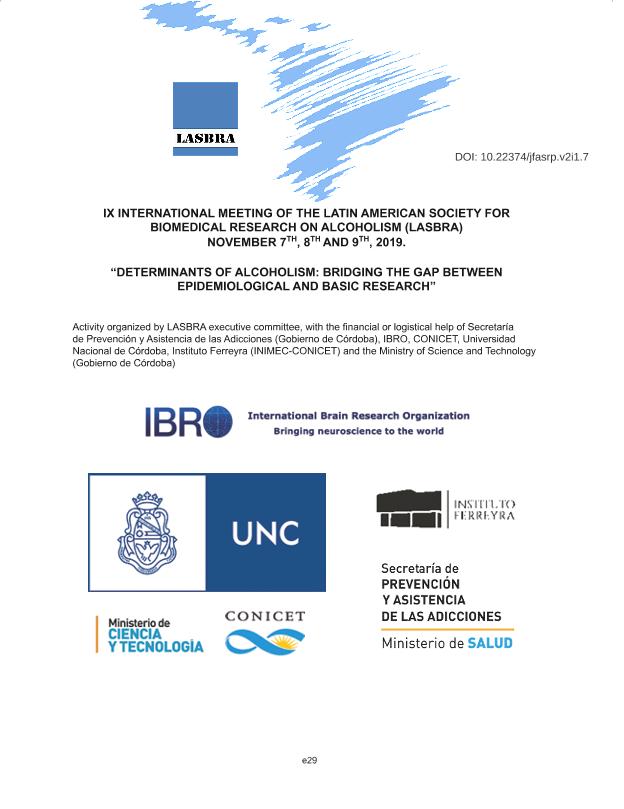Mostrar el registro sencillo del ítem
dc.contributor.author
Vera, Belén del Valle

dc.contributor.author
Pilatti, Angelina

dc.contributor.author
Pautassi, Ricardo Marcos

dc.date.available
2022-07-21T00:34:12Z
dc.date.issued
2019
dc.identifier.citation
ELSA cohort 2014: Acute Alcohol Effect on Inhibitory Control, Reward Sensitivity and Risk Taking in College Students with High and Low Trait Impulsivity; IX International Meeting of the Latin American Society for Biomedical Research on Alcoholism (LASBRA); Cordoba; Argentina; 2019; e60-e60
dc.identifier.uri
http://hdl.handle.net/11336/162697
dc.description.abstract
Introduction: Impulsivity and risk taking are core constructs to understand alcohol-related behaviors. Alcohol consumption is greater in those exhibiting relatively high levels of impulsivity and risk taking, and alterations in impulsivity and risk taking have been reported after acute alcohol ingestion. Aim: To examine the acute effect of ingested alcohol (0.6/0.7 g/kg in women and men respectively, equivalent to the expected breath alcohol concentration after a binge drinking episode) on inhibitory control, reward sensitivity and risk taking in students with high (IMP+) or low (IMP -) trait impulsivity. Methodology: 85 college students from the ELSA cohort 2014 (43 women, aged 21-27 years old [Mean age=22.74±1.51]) completed the BART (risk taking), GoStop (inhibitory control) and SKIP (reward sensitivity) tasks, before and after the consumption of an alcohol or a placebo drink. ELSA is a large, longitudinal study that analyzes alcohol-related behaviors in Argentinean college students. Results: Alcohol increased risk taking in women but not in men and induced a poorer inhibitory control, a result which was more pronounced in men than in women. Reward sensitivity was similar regardless alcohol or placebo. The hypothesis of greater behavioral impulsivity in those exhibiting higher trait impulsivity was partially corroborated. An interesting result was the differential effect of alcohol treatment on BrACs and subjective perceived intoxication between men and women. Specifically, women who received alcohol reached lower BrACs than men, but they felt more intoxicated and felt more intensely the sedative effects of alcohol than men. Conclusions: Alcohol induced increases in impulsivity and risk taking in a sex-dependent manner. Women were more sensitive to the acute effects of alcohol on risk-taking while men were more sensitive to the effects of the drug on inhibitory control. These results show that men and women are differently vulnerable to the toxic effects of alcohol on different indicators of behavioral impulsivity and risk taking.
dc.format
application/pdf
dc.language.iso
eng
dc.publisher
Dougmar Publishing Group
dc.rights
info:eu-repo/semantics/openAccess
dc.rights.uri
https://creativecommons.org/licenses/by-nc/2.5/ar/
dc.subject
TRAIT IMPULSIVITY
dc.subject
BEHAVIORAL IMPULSIVITY
dc.subject
RISK TAKING
dc.subject
ACUTE ALCOHOL ADMINISTRATION
dc.subject
EXPERIMENTAL DESIGN
dc.subject.classification
Otras Psicología

dc.subject.classification
Psicología

dc.subject.classification
CIENCIAS SOCIALES

dc.title
ELSA cohort 2014: Acute Alcohol Effect on Inhibitory Control, Reward Sensitivity and Risk Taking in College Students with High and Low Trait Impulsivity
dc.type
info:eu-repo/semantics/publishedVersion
dc.type
info:eu-repo/semantics/conferenceObject
dc.type
info:ar-repo/semantics/documento de conferencia
dc.date.updated
2022-07-19T15:46:42Z
dc.journal.volume
2
dc.journal.number
1
dc.journal.pagination
e60-e60
dc.journal.pais
Canadá

dc.journal.ciudad
Dundas
dc.description.fil
Fil: Vera, Belén del Valle. Universidad Nacional de Córdoba. Instituto de Investigaciones Psicológicas. - Consejo Nacional de Investigaciones Científicas y Técnicas. Centro Científico Tecnológico Conicet - Córdoba. Instituto de Investigaciones Psicológicas; Argentina. Universidad Nacional de Córdoba. Facultad de Psicología; Argentina
dc.description.fil
Fil: Pilatti, Angelina. Universidad Nacional de Córdoba. Instituto de Investigaciones Psicológicas. - Consejo Nacional de Investigaciones Científicas y Técnicas. Centro Científico Tecnológico Conicet - Córdoba. Instituto de Investigaciones Psicológicas; Argentina. Universidad Nacional de Córdoba. Facultad de Psicología; Argentina
dc.description.fil
Fil: Pautassi, Ricardo Marcos. Consejo Nacional de Investigaciones Científicas y Técnicas. Centro Científico Tecnológico Conicet - Córdoba. Instituto de Investigación Médica Mercedes y Martín Ferreyra. Universidad Nacional de Córdoba. Instituto de Investigación Médica Mercedes y Martín Ferreyra; Argentina. Universidad Nacional de Córdoba. Facultad de Psicología; Argentina
dc.relation.alternativeid
info:eu-repo/semantics/altIdentifier/url/http://jfasrp.com/index.php/JFASRP/article/view/7
dc.relation.alternativeid
info:eu-repo/semantics/altIdentifier/doi/http://dx.doi.org/10.22374/jfasrp.v2i1.7
dc.conicet.rol
Autor

dc.conicet.rol
Autor

dc.conicet.rol
Autor

dc.coverage
Internacional
dc.type.subtype
Reunión
dc.description.nombreEvento
IX International Meeting of the Latin American Society for Biomedical Research on Alcoholism (LASBRA)
dc.date.evento
2019-11-07
dc.description.ciudadEvento
Cordoba
dc.description.paisEvento
Argentina

dc.type.publicacion
Journal
dc.description.institucionOrganizadora
Latin American Society for Biomedical Research on Alcoholism
dc.source.revista
Journal of Fetal Alcohol Spectrum Disorder
dc.date.eventoHasta
2019-11-09
dc.type
Reunión
Archivos asociados
